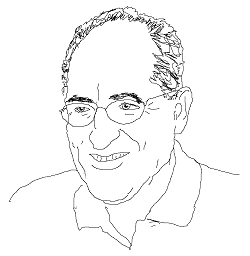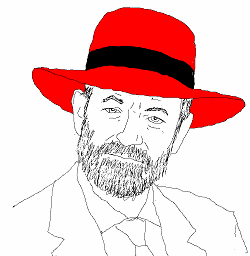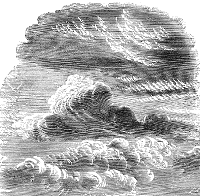Or perhaps Chomsky’s endorsement of Isaac Newton’s mysterianism. We tend to think of Newton as bringing physics to a triumphant state of perfection, one that lasted until Einstein, and with qualifications, still stands. Chomsky says that in fact Newton shattered the ambitions of mechanical science, which have never recovered; and in doing so he placed permanent limits on the human mind. He quotes Hume;
While Newton seemed to draw off the veil from some of the mysteries of nature, he shewed at the same time the imperfections of the mechanical philosophy; and thereby restored her ultimate secrets to that obscurity, in which they ever did and ever will remain.
What are they talking about? Above all, the theory of gravity, which relies on the unexplained notion of action at a distance. Contemporary thinkers regarded this as nonsensical, almost logically absurd: how could object A affect object B without contacting it and without and internediating substance? Newton, according to Chomsky, agreed in essence; but defended himself by saying that there was nothing occult in his own work, which stopped short where the funny stuff began. Newton, you might say, described gravity precisely and provided solid evidence to back up his description; what he didn’t do at all was explain it.
The acceptance of gravity, according to Chomsky, involved a permanent drop in the standard of intelligibility that scientific theories required. This has large implications for the mind it suggests there might be matters beyond our understanding, and provides a particular example. But it may well be that the mind itself is, or involves, similar intractable difficulties.
Chomsky reckons that Darwin reinforced this idea. We are not angels, after all, only apes; all other creatures suffer cognitive limitations; why should we be able to understand everything? In fact our limitations are as important as our abilities in making us what we are; if we were bound by no physical limitations we should become shapeless globs of protoplasm instead of human beings, and the same goes for our minds. Chomsky distinguishes between problems and mysteries. What is forever a mystery to a dog or rat may be a solvable problem for us, but we are bound to have mysteries of our own.
I think some care is needed over the idea of permanent mysteries. We should recognise that in principle there may be several things that look mysterious, notably the following.
- Questions that are, as it were, out of scope: not correctly definable as questions at all: these are answerable even by God.
- Mysterian mysteries; questions that are not in themselves unanswerable, but which are permanently beyond the human mind.
- Questions that are answerable by human beings, but very difficult indeed.
- Questions that would be answerable by human beings if we had further information which we (a) either just don’t happen to have, or which (b) we could never have in principle.
I think it’s just an assumption that the problem of mind, and indeed, the problem of gravity, fall into category 2. There has been a bit of movement in recent decades, I think, and the possibility of 3 or 4(a) remains open.
I don’t think the evolutionary argument is decisive either. Implicitly Chomsky assumes an indefinite scale of cognitive abilities matched by an indefinite scale of problems. Creatures that are higher up the first get higher up the second, but there’s always a higher problem. Maybe, though, there’s a top to the scale of problems? Maybe we are already clever enough in principle to tackle them all.
If this seems optimistic, think of Chomsky the Lizard, millions of years ago. Some organisms, he opines, can stick their noses out of the water. Some can leap out, briefly. Some crawl out on the beach for a while. Amphibians have to go back to reproduce. But all creatures have a limit to how far they can go from the sea. We lizards, we’ve got legs, lungs, and the right kind of eggs; we can go further than any other. That does not mean we can go all over the island. Evolution guarantees that there will always be parts of the island we can’t reach.
Well, depending on the island, there may be inaccessible parts, but that doesn’t mean legs and lungs have inbuilt limits. So just because we are products of evolution, it doesn’t mean there are necessarily questions of type 2 for us.
Chomsky mocks those who claim that the idea of reducing the mind to activity of the brain is new and revolutionary; it has been widely espoused for centuries, he says. He mentions remarks of Locke which I don’t know, but which resemble the famous analogy of Leibniz’s mill.
If we imagine that there is a machine whose structure makes it think, sense, and have perceptions, we could conceive it enlarged, keeping the same proportions, so that we could enter into it, as one enters a mill. Assuming that, when inspecting its interior, we will find only parts that push one another, and we will never find anything to explain a perception.
The thing about that is, we’ll never find anything to explain a mill, either. Honestly, Gottfried, all I see is pieces of wood and metal moving around; none of them have any milliness? How on earth could a collection of pieces of wood – just by virtue of being arranged in some functional way, you say – acquire completely new, distinctively molational qualities?

 We’ll never understand consciousness, says Edward Witten. Ashutosh Jogalekar’s post
We’ll never understand consciousness, says Edward Witten. Ashutosh Jogalekar’s post  ‘Aping Mankind’ is a large scale attack by Raymond Tallis on two reductive dogmas which he characterises as ‘Neuromania’ and ‘Darwinitis’. He wishes especially to refute the identification of mind and brain, and as an expert on the neurology of old age, his view of the scientific evidence carries a good deal of weight. He also appears to be a big fan of Parmenides, which suggests a good acquaintance with the philosophical background. It’s a vigorous, useful, and readable contribution to the debate.
‘Aping Mankind’ is a large scale attack by Raymond Tallis on two reductive dogmas which he characterises as ‘Neuromania’ and ‘Darwinitis’. He wishes especially to refute the identification of mind and brain, and as an expert on the neurology of old age, his view of the scientific evidence carries a good deal of weight. He also appears to be a big fan of Parmenides, which suggests a good acquaintance with the philosophical background. It’s a vigorous, useful, and readable contribution to the debate.
 I’d like to say a word for mystery. I think Haldane summed it up:
I’d like to say a word for mystery. I think Haldane summed it up: I hate that quote so much! The complacent fake modesty; the characteristic Oxford attitude of mingled superiority and second-ratism: don’t you go thinking you can apply your mind to these weighty issues, little man; the best you can do is listen reverently to the words of our mighty predecessors. Footnotes to Plato! Footnotes to Plato!
I hate that quote so much! The complacent fake modesty; the characteristic Oxford attitude of mingled superiority and second-ratism: don’t you go thinking you can apply your mind to these weighty issues, little man; the best you can do is listen reverently to the words of our mighty predecessors. Footnotes to Plato! Footnotes to Plato! I was thinking about the New Mysterian position the other day, and it occurred to me that there are some scary implications which I, at any rate, had never noticed before.
I was thinking about the New Mysterian position the other day, and it occurred to me that there are some scary implications which I, at any rate, had never noticed before.